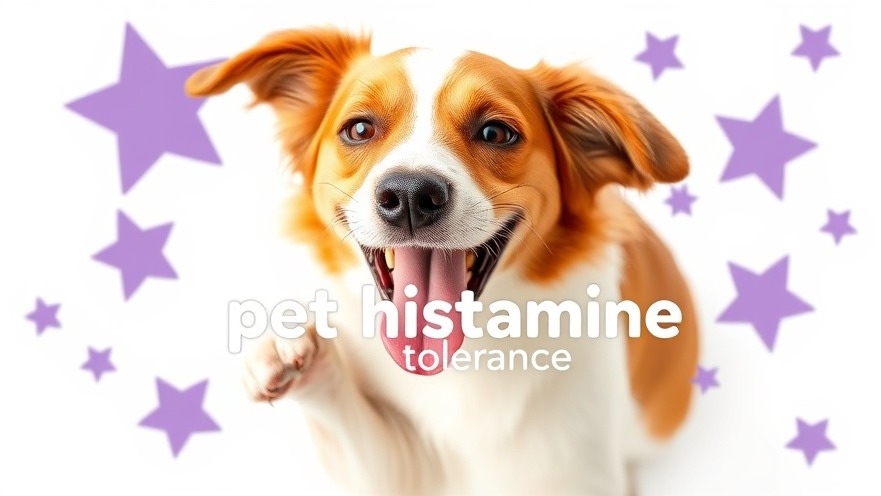
Understanding Histamine Intolerance in Pets
As pet owners, we often notice our furry friends scratching, shaking their heads, or seeming overly anxious without knowing the root cause of their discomfort. While many of us jump to conclusions about allergies or dietary issues, one underlying cause that frequently flies under the radar is histamine intolerance (HIT). Regarding your pet's comfort and well-being, recognizing the signs and symptoms associated with HIT can be incredibly beneficial.
What is Histamine and Its Role in Your Pet’s Body?
Histamine is a naturally occurring compound produced in the body that plays crucial roles in the immune, digestive, and nervous systems. When everything is functioning well, histamine acts as an alarm system, alerting your pet's body to potential dangers like allergies or infections. However, when histamine levels become excessive, they can provoke a host of distressing symptoms—in particular, persistent itching, upset stomach, or even behavioral changes.
Recognizing the Symptoms
The symptoms associated with histamine intolerance can be confused with regular allergies, leading many pet owners to take incorrect approaches to treatment. Common indications that your pet may be suffering from HIT include:
Persistent scratching, especially in sensitive areas like the paws and belly
Skin reactions such as redness or hot spots
Gastrointestinal issues, including diarrhea or bloating
Difficulty breathing or coughing
Identifying these signs early on and understanding their correlation to histamine intolerance can help your pet return to their happy, healthy state.
Common Causes of Histamine Intolerance
Histamine intolerance often arises when the body's ability to metabolize histamine diminishes. Several factors can contribute to this issue, including:
Gut Damage: A disrupted gut microbiome can severely impact a pet's ability to break down histamine effectively.
Liver Overload: The liver plays a key role in breaking down histamine, so liver health is pivotal.
Medications: Certain medications can hinder histamine breakdown, leading to potential intolerances.
Environmental Allergens: Allergens such as pollen, dust, and mold can escalate histamine reactions.
Chronic Stress: Emotional stress can also influence histamine levels, making it vital to ensure your pet's overall well-being.
As dog owners, it's essential to consider these factors when evaluating your pup's health.
Dietary Adjustments to Manage Histamine Intolerance
The foods your pet eats can significantly influence their histamine levels. High-histamine foods—such as fermented products, aged cheeses, and certain processed meats—can exacerbate symptoms. Instead, consider incorporating:
Fresh meats like chicken or turkey, which are typically lower in histamine
Simple grains such as rice or oatmeal
Low-histamine fruits like apples or blueberries
By providing a well-balanced diet that prioritizes these fresh options, you can support your pet's overall gut health and assist in managing histamine levels.
Natural Remedies and Support for Your Pet
Helping your pet combat histamine intolerance may also require natural treatments and strategies beyond dietary changes:
Gut Health Support: Introducing probiotics can enhance gut flora, fostering better digestion and improving histamine metabolism.
Liver Support: Certain supplements, like milk thistle or dandelion root, can promote liver health, optimizing its detoxification capabilities.
Stress Management: Create a calming environment for your pet through exercises like leash walks, interactive play, and puzzle toys to keep them mentally stimulated.
These practices can collectively help restore balance to your pet’s body, easing discomfort and improving their quality of life.
Future Considerations for Your Pet’s Health
As with any health issue, remaining proactive is key. Keep an eye on your dog’s symptoms and consider regular check-ups with a veterinarian who understands histamine intolerance. If dietary changes and lifestyle adjustments do not provide relief, seeking the advice of a specialist may uncover additional insights tailored to your pet's unique health needs.
Final Thoughts
Your dog’s well-being is invaluable, and by understanding histamine intolerance, you can set the stage for healthier, happier days ahead. Should you notice any symptoms resembling HIT, take the necessary steps to adjust their diet and lifestyle, and consult with a veterinarian if required. Remember, you know your pet best, and advocating for their health can lead to a fulfilling life for both of you.
For more insights about maintaining your dog’s optimal health, consider subscribing to newsletters that provide valuable information, tips, and guidance tailored to your pet’s needs. Your furry friend deserves the best!
 Add Row
Add Row  Add
Add 




Write A Comment